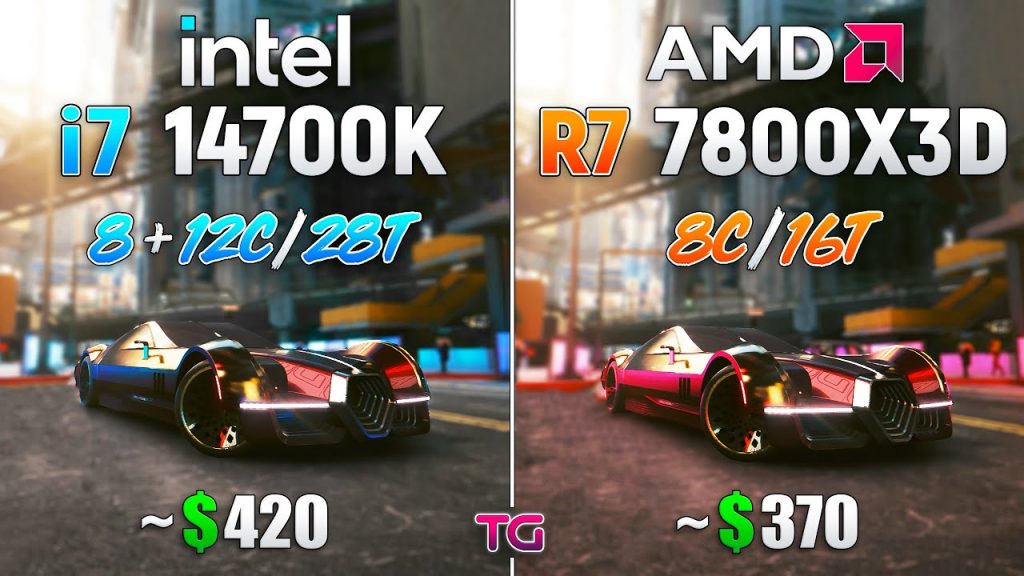In the ever-evolving world of high-performance CPUs, the comparison between the Intel Core i7-14700K and the AMD Ryzen 7 7800X3D is more relevant than ever. These two processors cater to gamers, content creators, and enthusiasts looking for optimal performance, efficiency, and value. Below, we offer a deep technical and performance-focused comparison across architecture, gaming, productivity, thermals, and future-proofing capabilities.

Architecture and Specifications Overview
| Specification | Intel Core i7-14700K | AMD Ryzen 7 7800X3D |
|---|---|---|
| Architecture | Raptor Lake Refresh | Zen 4 (3D V-Cache) |
| Cores/Threads | 20 (8P + 12E) / 28 Threads | 8 Cores / 16 Threads |
| Base Clock | P-cores: 3.4 GHz | 4.2 GHz |
| Max Boost Clock | Up to 5.6 GHz | Up to 5.0 GHz |
| L3 Cache | 33 MB | 96 MB |
| TDP | 125W (253W boost) | 120W |
| Socket | LGA 1700 | AM5 |
| PCIe Support | PCIe 5.0 | PCIe 5.0 |
| Memory Support | DDR4 / DDR5 | DDR5 only |
The i7-14700K brings a hybrid architecture with Performance and Efficiency cores, while the 7800X3D leverages 3D V-Cache technology, giving it an edge in cache-heavy gaming workloads.
Gaming Performance: Frame Rates and Latency
When evaluating gaming performance, Ryzen 7 7800X3D consistently dominates in titles optimized for cache usage. Games like Hogwarts Legacy, Starfield, and Rainbow Six Siege show frame rate advantages up to 15–20% in 1080p scenarios, where CPU bottlenecks are most apparent.
On the other hand, Intel i7-14700K performs impressively in CPU-intensive strategy and simulation games, such as Total War: Warhammer III, thanks to its higher thread count and superior single-thread boost frequency.
In benchmarks using an RTX 4080:
Ryzen 7 7800X3D: Averaged 230 FPS in CS:GO
i7-14700K: Averaged 207 FPS in the same scenario
This margin widens in eSports titles, but shrinks slightly in games that scale across more threads.
Productivity and Multi-Core Performance
While AMD’s processor leads in gaming, the Intel Core i7-14700K demonstrates clear superiority in multi-core workloads such as video editing, 3D rendering, and heavy multitasking. The 20-core hybrid configuration enables it to outperform the 7800X3D by 25–30% in applications like Blender, Adobe Premiere Pro, and Cinebench R23 multi-core.
| Application | i7-14700K Score | 7800X3D Score |
|---|---|---|
| Cinebench R23 (Multi-Core) | 30,100 | 19,200 |
| Blender Classroom Render | 145 seconds | 190 seconds |
| Handbrake 4K Encoding | 73 FPS | 59 FPS |
This makes the i7-14700K more suitable for users with hybrid workloads that demand both gaming and content creation efficiency.
Thermal Efficiency and Power Consumption
AMD continues to excel in thermal design and power efficiency. The 7800X3D runs significantly cooler and consumes less power under sustained load compared to Intel’s i7-14700K, which can draw upwards of 253W during PL2 boost phases.
Power and Thermals Comparison
In air- or liquid-cooled setups, AMD’s chip offers a quieter and cooler experience, particularly beneficial for compact builds or users prioritizing energy efficiency.
Memory and Platform Compatibility
Intel offers greater flexibility by supporting both DDR4 and DDR5 memory, allowing users to upgrade gradually. AMD’s 7800X3D, being a Zen 4 part, supports only DDR5, but benefits from higher memory bandwidth and lower latency, especially with EXPO-optimized kits.
| Feature | i7-14700K | 7800X3D |
|---|---|---|
| DDR4 Compatibility | Yes | No |
| DDR5 Support | Yes | Yes |
| Overclocking | Yes (Unlocked) | Limited (Non-X) |
| Platform Longevity | LGA1700 (2021) | AM5 (2022–2026) |
AMD’s AM5 platform promises future CPU support until at least 2026, while LGA1700 is at the end of its lifecycle with Intel’s upcoming Arrow Lake transitioning to a new socket.
Value and Pricing Analysis
The Ryzen 7 7800X3D offers top-tier gaming performance at a compelling price point, often undercutting Intel’s chip in both initial cost and long-term platform expense due to AM5’s promised longevity.
Conversely, the i7-14700K provides unmatched all-around performance but may incur additional cooling and power supply costs due to its higher thermal output.
| Category | Best Choice |
|---|---|
| Gaming Performance | Ryzen 7 7800X3D |
| Multi-Core Workloads | i7-14700K |
| Power Efficiency | Ryzen 7 7800X3D |
| Upgrade Flexibility | i7-14700K |
| Long-Term Platform | Ryzen 7 7800X3D |
-
Choose the Ryzen 7 7800X3D if your primary focus is gaming. Its 3D V-Cache technology delivers unmatched FPS across the most popular AAA and competitive titles, while running cooler and more efficiently.
-
Opt for the Intel Core i7-14700K if you require high-performance for productivity tasks in addition to gaming. Its 20-core hybrid layout ensures excellent scalability and responsiveness for creators and professionals.
Both CPUs stand out as elite options in the market. Your decision should ultimately align with your workload demands, budget, and long-term platform preferences.




